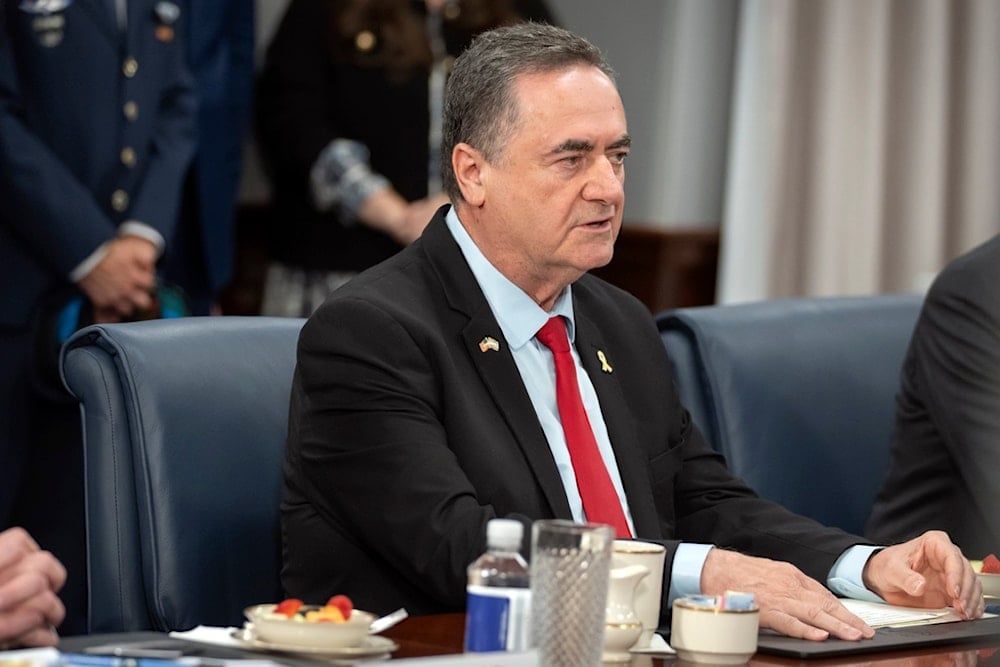Israeli media crackdown intensifies with Army Radio shutdown order
Security Minister Israel Katz orders Army Radio’s closure by 2026, deepening concerns over press freedom amid growing Israeli government control.
-

Israeli Security Minister Israel Katz speaks during a meeting with Secretary of Defense Pete Hegseth at the Pentagon on July 18, 2025, in Washington (AP)
Israeli Security Minister Israel Katz has ordered the closure of Army Radio, a move widely seen as both symbolic and contentious, as the Israeli government moves to reshape the Israeli media landscape.
On Wednesday, Katz announced that Army Radio, a military-run station and a long-standing fixture in Israeli culture, is set to stop broadcasting by March 1, 2026, stating that its civilian-style journalism “harms the war effort and morale” and does not align with the military’s nonpartisan mandate.
In a statement, Katz described the closure as necessary, asserting that Army Radio had strayed from its original mission of serving as a voice for soldiers and their families and had instead evolved into a platform for opinions critical of the Israeli occupation forces.
“What was will no longer be,” Katz said, emphasizing that “Army Radio was established by the Israeli government as a military station to serve as a voice and ear for IDF soldiers and their families — not as a platform for opinions, many of which attack the IDF and its soldiers.”
Citing "national security concerns" to support the move, he added that “enemies interpret these messages as if they are being conveyed" by the army itself.
The security minister said he plans to submit the proposal for government approval and set up a professional team to oversee the shutdown, address staff rights, and maintain the continued operation of the sister network Galgalatz, a Top 40 music station whose traffic reports represent its closest connection to news.
'Israel' cracks down on freedom of press
Katz’s decision comes amid rising concern among journalists, media watchdogs, and legal experts over Prime Minister Benjamin Netanyahu’s broader push to consolidate control over "Israel’s" media landscape, with critics suggesting a coordinated effort to rein in outlets perceived as hostile or unsympathetic to government messaging.
Earlier, Communications Minister Shlomo Karhi advanced a sweeping media reform bill, arguing it would increase competition and lower costs for consumers. The legislation, which passed its first reading, would weaken long-standing safeguards designed to maintain editorial independence, prompting critics to warn that the changes could allow greater political or corporate influence over newsroom content.
Analysts note that publicly funded news outlets have long served as a key buffer against a media environment dominated by private interests. Netanyahu himself has repeatedly been accused of seeking tighter control over the media, criticizing outlets he sees as biased, boycotting networks over staffing decisions, and allegedly attempting to influence coverage through his office.
Two of the three cases in his current corruption trial relate to attempts to sway media reporting, and in recent years, he has largely avoided mainstream Israeli media, including Army Radio, choosing instead to grant interviews only to friendly outlets at home or abroad.
Government officials have also targeted the Kan public broadcaster for maintaining editorial independence. “What good is public broadcasting if we can’t control it?” former IOF spokesperson and current Transportation Minister Miri Regev asked in 2016, reflecting longstanding frustrations over outlets that do not align with government perspectives.

 3 Min Read
3 Min Read










